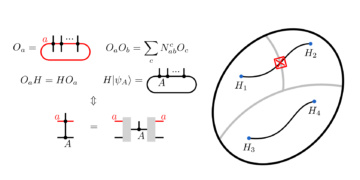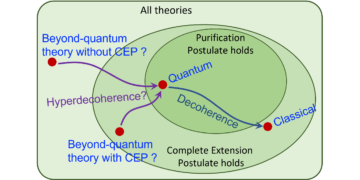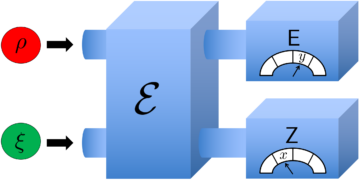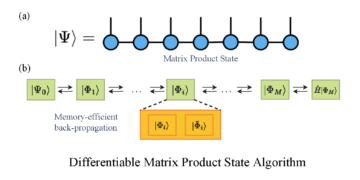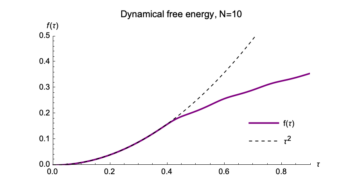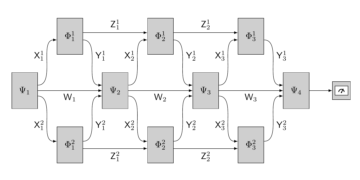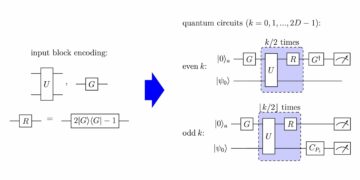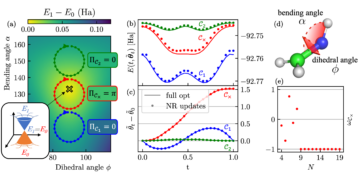1Department of Mathematics and Statistics, University of Ottawa, Canada
2Department of Computing and Mathematical Sciences, California Institute of Technology, USA
Find this paper interesting or want to discuss? Scite or leave a comment on SciRate.
Abstract
We establish a strong monogamy-of-entanglement property for subspace coset states, which are uniform superpositions of vectors in a linear subspace of $mathbb{F}_2^n$ to which has been applied a quantum one-time pad. This property was conjectured recently by [Coladangelo, Liu, Liu, and Zhandry, Crypto’21] and shown to have applications to unclonable decryption and copy-protection of pseudorandom functions. We present two proofs, one which directly follows the method of the original paper and the other which uses an observation from [Vidick and Zhang, Eurocrypt’20] to reduce the analysis to a simpler monogamy game based on BB’84 states. Both proofs ultimately rely on the same proof technique, introduced in [Tomamichel, Fehr, Kaniewski and Wehner, New Journal of Physics ’13].
Featured image: A diagram representing the interactions in the strong monogamy game
Popular summary
In this work, we study the winning probability of an MoE game called the strong monogamy game. In this game, Alice measures her $n$-qubit system in a basis of subspace coset states, which is a basis that arises from a linear subspace of the finite vector space of $n$ bits. An important property of this basis is that it is naturally indexed by two indices, one corresponding to a coset of the subspace and the other to a coset of its orthogonal complement. To win the game, Bob is only required to guess the first index correctly and Charlie is only required to guess the second. Nevertheless, we show that the optimal winning probability is exponentially small in the number of qubits. The bound also holds for a version of the game where Alice sends subspace coset states rather than measuring in a basis; this version has applications to uncloneable quantum cryptography, where the no-cloning property of quantum states, closely related to MoE, is exploited to achieve classically impossible security.
► BibTeX data
► References
[1] V. V. Albert, J. P. Covey, and J. Preskill. Robust encoding of a qubit in a molecule. Physical Review X, 10(3), 2020. DOI: 10.1103/physrevx.10.031050.
https://doi.org/10.1103/physrevx.10.031050
A. Coladangelo, J. Liu, Q. Liu, and M. Zhandry. Hidden cosets and applications to unclonable cryptography. In T. Malkin and C. Peikert, editors, Advances in Cryptology – CRYPTO 2021, pages 556–584, Cham, 2021. Springer International Publishing. DOI: 10.1007/978-3-030-84242-0_20.
https://doi.org/10.1007/978-3-030-84242-0_20
[3] N. Johnston, R. Mittal, V. Russo, and J. Watrous. Extended non-local games and monogamy-of-entanglement games. Proceedings of the Royal Society A: Mathematical, Physical and Engineering Sciences, 472(2189): 20160003, 2016. DOI: 10.1098/rspa.2016.0003.
https://doi.org/10.1098/rspa.2016.0003
[4] M. Koashi. Unconditional security of quantum key distribution and the uncertainty principle. In Journal of Physics: Conference Series, volume 36, page 016. IOP Publishing, 2006. DOI: 10.1088/1742-6596/36/1/016.
https://doi.org/10.1088/1742-6596/36/1/016
[5] M. Tomamichel, S. Fehr, J. Kaniewski, and S. Wehner. A monogamy-of-entanglement game with applications to device-independent quantum cryptography. New Journal of Physics, 15(10): 103002, 2013. DOI: 10.1088/1367-2630/15/10/103002.
https://doi.org/10.1088/1367-2630/15/10/103002
[6] M. Tomamichel and A. Leverrier. A largely self-contained and complete security proof for quantum key distribution. Quantum, 1: 14, 2017. DOI: 10.22331/q-2017-07-14-14.
https://doi.org/10.22331/q-2017-07-14-14
[7] T. Vidick and T. Zhang. Classical proofs of quantum knowledge. In Annual International Conference on the Theory and Applications of Cryptographic Techniques, pages 630–660. Springer, 2021. DOI: 10.1007/978-3-030-77886-6_22.
https://doi.org/10.1007/978-3-030-77886-6_22
Cited by
[1] Anne Broadbent and Eric Culf, “Rigidity for Monogamy-of-Entanglement Games”, arXiv:2111.08081.
[2] Andrea Coladangelo, Jiahui Liu, Qipeng Liu, and Mark Zhandry, “Hidden Cosets and Applications to Unclonable Cryptography”, arXiv:2107.05692.
[3] Prabhanjan Ananth, Fatih Kaleoglu, Xingjian Li, Qipeng Liu, and Mark Zhandry, “On the Feasibility of Unclonable Encryption, and More”, arXiv:2207.06589.
The above citations are from SAO/NASA ADS (last updated successfully 2022-09-01 14:26:51). The list may be incomplete as not all publishers provide suitable and complete citation data.
Could not fetch Crossref cited-by data during last attempt 2022-09-01 14:26:50: Could not fetch cited-by data for 10.22331/q-2022-09-01-791 from Crossref. This is normal if the DOI was registered recently.
This Paper is published in Quantum under the Creative Commons Attribution 4.0 International (CC BY 4.0) license. Copyright remains with the original copyright holders such as the authors or their institutions.


